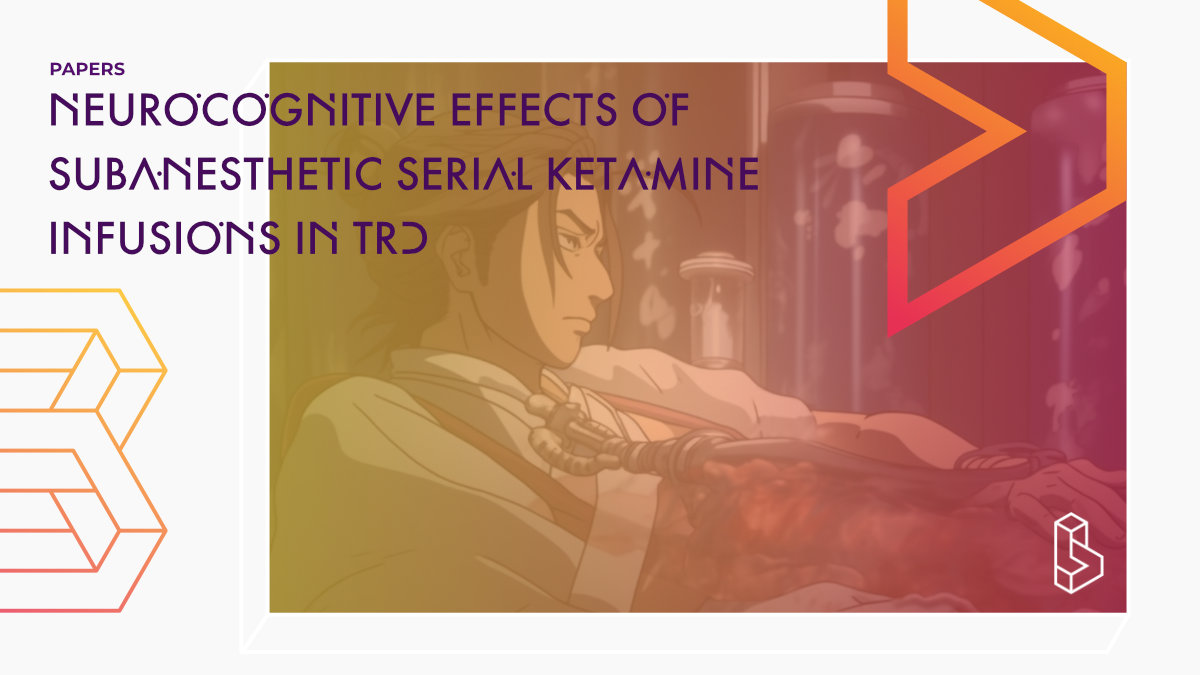This open-label study (n=66) finds that four ketamine infusions (35mg/70kg) led to improvements in cognition both immediately (measured after the first and fourth infusion) and up to five weeks later. As seen in other studies, antidepressant effects reverted to baseline at five weeks.
Abstract of Neurocognitive effects of subanesthetic serial ketamine infusions in TRD
“Introduction: Ketamine treatment prompts a rapid antidepressant response in treatment-resistant depression (TRD). We performed an exploratory investigation of how ketamine treatment in TRD affects different cognitive domains and relates to antidepressant response.
Methods: Patients with TRD (N = 66; 30 M/35F; age = 39.5 ± 11.1 years) received four ketamine infusions (0.5 mg/kg). Neurocognitive function and depressive symptoms were assessed at baseline, 24 h after the first and fourth ketamine infusion, and 5 weeks following end of treatment. Mixed effect models tested for changes in seven neurocognitive domains and antidepressant response, with post-hoc pairwise comparisons between timepoints, including follow-up. Relationships between change in neurocognitive function and antidepressant response over the course of treatment were tested with Pearson’s correlation and mediation analyses. Associations between baseline neurocognitive performance and antidepressant response were tested with Pearson’s correlation.
Results: Significant improvements in inhibition, working memory, processing speed, and overall fluid cognition were observed after the first and fourth ketamine infusion. Improvements in processing speed and overall fluid cognition persisted through follow-up. Significant improvements in depressive symptoms reverted towards baseline at follow-up. Baseline working memory and change in inhibition were moderately correlated with antidepressant response, however, improvements in neurocognitive performance were statistically independent from antidepressant response.
Conclusion: Antidepressant ketamine leads to improved neurocognitive function, which persist for at least 5 weeks. Neurocognitive improvements observed appear independent of antidepressant response, suggesting ketamine may target overlapping but distinct functional brain systems. Limitations Research investigating repeated serial ketamine treatments is important to determine cognitive safety. This study is a naturalistic design and does not include placebo.”
Authors: Artemis Zavaliangos-Petropulu, Shawn M. McClintock, Jacqueline Khalil, Shantanu H. Joshi, Brandon Taraku, Noor B. Al-Sharif, Randall T. Espinoza & Katherine L. Narr
Summary of Neurocognitive effects of subanesthetic serial ketamine infusions in TRD
The World Health Organization estimates that 322 million people worldwide suffer from major depressive disorder. 30% of patients remain untreated despite two or more adequate antidepressant trials.
Ketamine is an N-methyl-D aspartate (NMDA) glutamate receptor antagonist shown to elicit rapid antidepressant effects in about 60-70% of patients with TRD. Ketamine has not received US Food and Drug Administration approval for antidepressant use.
Ketamine is widely used in medicine, but high doses can lead to cognitive impairment and other negative health consequences. Despite mixed findings, some evidence suggests that baseline neurocognitive performance may moderate clinical outcomes following serial ketamine treatment.
Find this paper
Neurocognitive effects of subanesthetic serial ketamine infusions in treatment resistant depression
https://doi.org/10.1016/j.jad.2023.04.015
Paywall | Google Scholar | Backup | 🕊
Study details
Compounds studied
Ketamine
Topics studied
Neuroscience
Treatment-Resistant Depression
Depression
Study characteristics
Open-Label
Within-Subject
Participants
66
Humans
Compound Details
The psychedelics given at which dose and how many times
Ketamine 35 mg | 4x
